Definition, Features, Characteristics, Distinction between - Bills of Exchange, Cheque, Promissory Note - Comparison | 12th Commerce : Chapter 22 : The Negotiable Instruments Act 1881
Chapter: 12th Commerce : Chapter 22 : The Negotiable Instruments Act 1881
Bills of Exchange, Cheque, Promissory Note - Comparison
Bills of Exchange, Cheque, Promissory Note - Comparison
Bill of Exchange – Definition
According to section 5 of the Negotiable
Instruments Act, “a bill of exchange is an instrument in writing containing an
unconditional order, signed by the maker, directing a certain person to pay a
certain sum of money only to, or to the order of a certain person or to the
bearer of the instrument”.
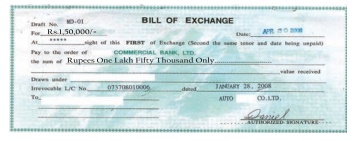
Characteristics of a Bill of Exchange
i. A bill of exchange is a document in writing.
ii. The document must contain an order to pay.
iii. The order must be unconditional.
iv. The instrument must be signed by the person who
draws it.
v. The name of the person on whom the bill is drawn
must be specified in the bill itself.
vi. The drawer, drawee and payee must all be
certain. A bill cannot be drawn on two or more drawees in the alternative
because where liability lies, ‘no ambiguity must lie’. However, alternative
payees are permitted in the law.
vii. The amount that is required to be paid must
also be specified in the bill.
viii. The bill may be payable on demand or after a
specified period.
ix. It must comply with formalities regarding date,
consideration, stamps etc.,
A bill of exchange can be made payable on demand to
a person. It can be made payable after a specified period. But it cannot be
payable to bearer on demand.
Cheque - Definition
According to section 6 of the Negotiable
Instruments Act, 1881 defines a cheque as “a bill of exchange drawn on a
specified banker and not expressed to be payable otherwise than on demand”.
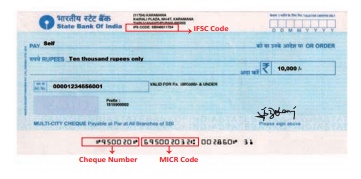
Features of a Cheque
(i) Instrument in Writings
A cheque or a bill or a promissory note must be an
instrument in writing. Though the law does not prohibit a cheque being written
in pencil, bankers never accept it because of risks involved. Alternation is
quite easy but detection impossible in such cases.
(ii) Unconditional Orders
The instrument must contain an order to pay money.
It is not necessary that the word ‘order’ or its equivalent must be used to
make the document a cheque. It does not cease to be a cheque just because the
world ‘please’ is used before the word pay. Further the order must be unconditional.
In other words, payment of money is made dependent on the happening of an event
or on a fulfilment of a condition, the instrument loses the characteristics of
a cheque.
(iii) Drawn on a Specified Banker Only
The cheque is always drawn on a specified banker. A
cheque vitally differs from a bill in this respect as latter can be drawn on
any person including a banker. The customer of a banker can draw the cheque
only on the particular branch of the bank where he has an account.
(iv) A Certain Sum of Money Only
The order must be for payment of only money. If the
banker is asked to deliver securities, the document cannot be called a cheque.
Further, the sum of money must be certain.
(v) Payee to be Certain
The cheque must be made payable to a certain person
or to the order of a certain person or to the bearer of the instrument. The
word, person includes bodies corporate, local authorities, associations,
holders of office of an institution etc.,
(vii) Signed by the Drawer
The cheque is to be signed by the drawer. Further,
it should tally with specimen signature furnished to the bank at the time of
opening the account.
(vi) Payable Always on Demand
A cheque is always payable on demand. The words on
demand are not used when the drawee bank is asked to pay and the time for its
payment is not specified, it is considered to be payable on demand.
Difference between a Bill of Exchange and a Cheque
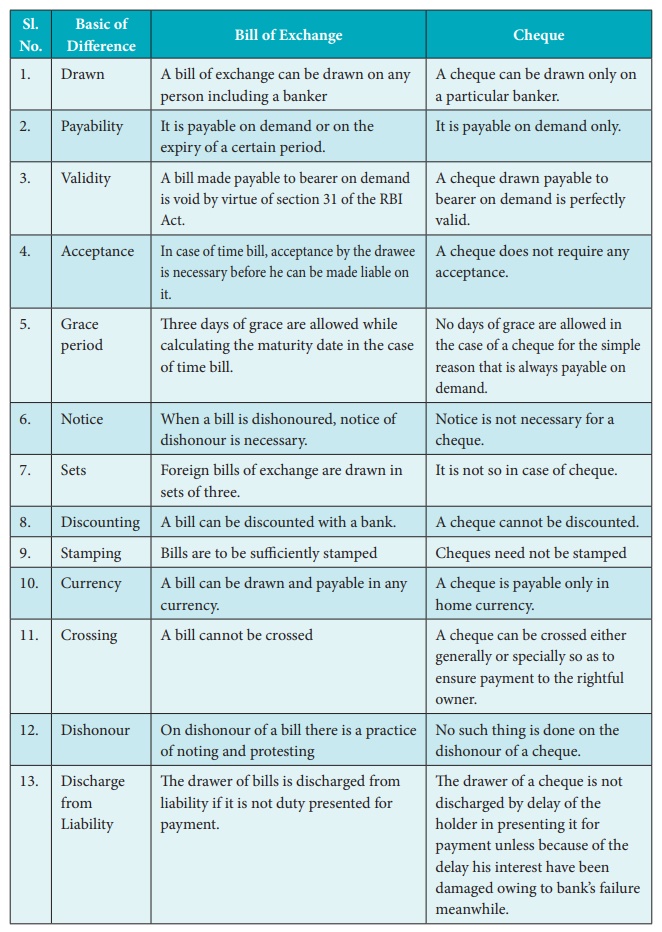
Promissory Note
According to Section 4 of the Negotiable
Instruments Act, “a promissory note is an instrument in writing (not being a
bank note or a currency note) containing an unconditional undertaking singed by
the maker, to pay a certain sum of money only to or to the order of, a certain
person or to the bearer of the instrument.
Characteristics of a Promissory Note
1. A promissory note must be in writing. An oral
promise to pay does not constitute a promissory note.
2. It must contain a promise or undertaking to pay
a mere acknowledgement of indebtedness will not make it a promissory note.
3. The promise to pay must be unconditional. In
other words, the promise to pay must not depend upon the happening of any
uncertain event.
4. It must be signed by the maker. The signature
must be in any part of the instrument and it need not be at the bottom.
5. The maker of the note must be a certain person.
Where there are two or more makers, they
may bind themselves jointly or jointly and severability. But alternative
promissors are not permitted in law because where liability lies no ambiguity
must lie.
6. The payee must be certain. A note is valid even
if the payee is misnamed or indicated by his official designation only.
Alternative payees are permissible in law. But is must be made payable to order
originally.
7. A promissory note originally made payable to
bearer is illegal.
8. The promise must be for payment of money only.
For eg. a note containing a promise to deliver 50 bags of rice is not a
promissory note.
9. The sum payable must be certain and must be
specified in the note itself.
10. The amount payable must be in legal tender
money of India and a note containing a promise to pay a certain amount of
foreign money is not a promissory note.
11. A bank note or a currency note is not a
promissory note.
12. A promissory note must be sufficiently stamped.
Distinction between a Cheque and Promissory note
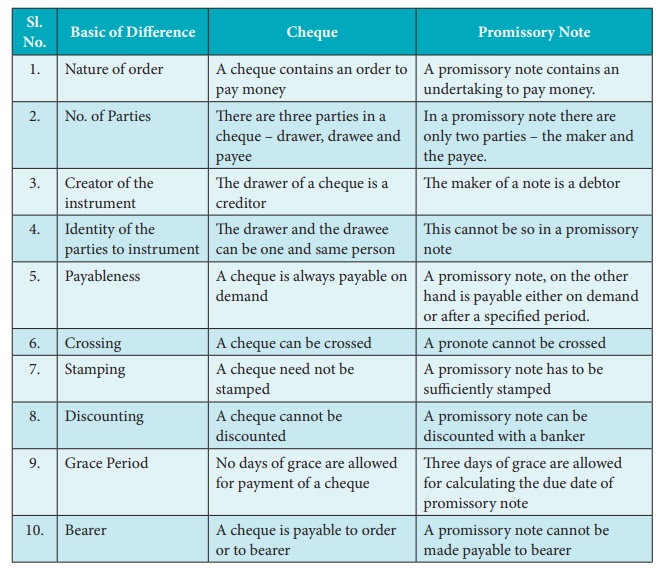
Distinction between a Bills of Exchange and Promissory note
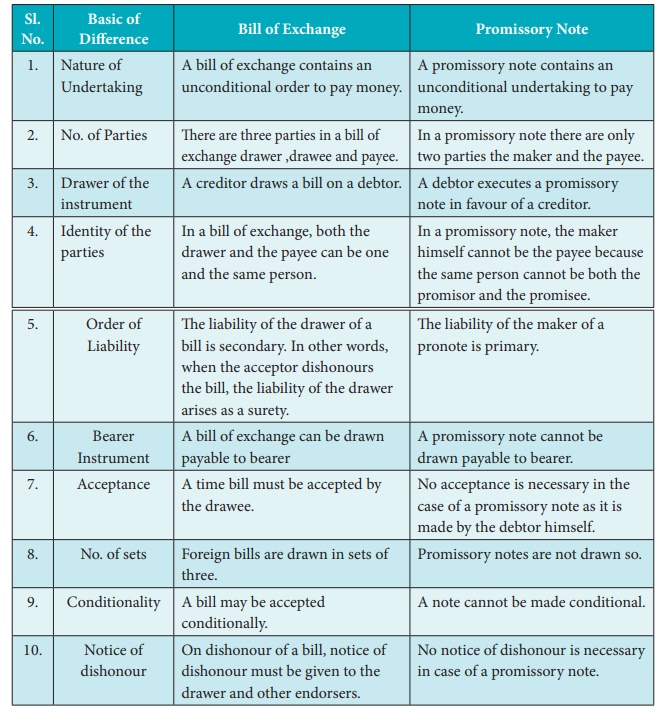
Related Topics